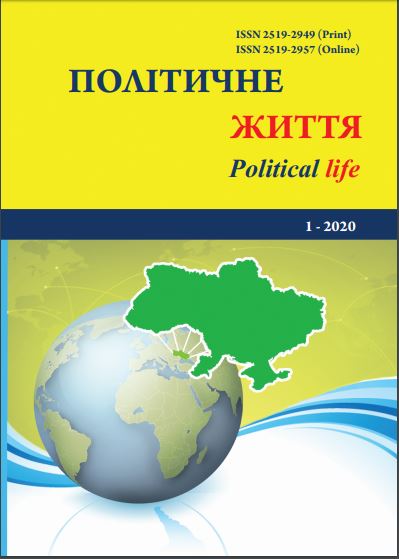Comparative characteristics of the legal and institutional basis of the digital diplomacy of the Slovak republic and Hungary.
DOI:
https://doi.org/10.31558/2519-2949.2020.1.17Keywords:
digital diplomacy, foreign policy, the Slovak Republic, Hungary, public diplomacyAbstract
In terms of the modern diffusion and global deployment of network technologies and online platforms around the world, as well as their growing role and impact on different spheres of life, including foreign policy, we consider the latest phenomenon of digital diplomacy as a result of the evolution of communication with foreign audiences and its partial transition to the digital space. Therefore, with this article, the author joins the debate about the phenomenon of digital diplomacy, which hasn’t reached adefinitive theoretical conceptualization yet. Accordingly, there is a need to study the approaches of different states thereto in order to identify common and distinct features in the interpretation of the phenomenon and their practical application. In particular, this paper analyzes the organizational and legal basis of digital diplomacy in the two countries of the Visegrad Group, in particular in the Slovak Republic and Hungary.
The article focuses on the approach of the Slovak Republic and Hungary to digital diplomacy and their key institutions dealing with this sphere. To this end, the author provides a comprehensive overview of the legal framework that underpins the development of digital diplomacy in the Slovak Republic and Hungary, as well as analyzes the system of governmental and non-governmental organizations currently active in this field that are responsible for its development in both countries as well as ways of attaining the goals of digital diplomacy by these organizations and namely, their respective departments. In addition, the article proposes further perspectives for the progressive development and improvement of the effectiveness of digital diplomacy initiatives, programs and institutions in the Slovak Republic and Hungary, based on a comparative analysis of the current findings. It was found that the comprehensive program on the use of digital diplomacy instruments to unify states’ images in the online space, as well as to enhance the protection of national interests and the promotion of foreign policy initiatives, should be developed
at both states.
References
Hocking B. Digital Diplomacy in the Digital Age,. Clingendael Institute, 2015.
Cull N.J. The Long Road to Public Diplomacy 2.0: The Internet in US Public Diplomacy. International Studies Review 15 (1), 2013.
Manor I. What is Digital Diplomacy, and how is it Practiced around the World? A brief introduction. Diplomatist Magazine 2016 Annual Edition, 2016.
Pocheptsov, Georgii. Cognitive Attacks in Russian Hybrid Warfare. Information & Security: An International Journal. 41. 2018. p. 37-43.
Pipchenko Nataliya, Makarenko Ievgeniia and Ryzhkov Mykola. Current Challenges to the EU Integration Policy. On-Line Journal Modelling the New Europe, № 31 / 2019, p. 37-60, https://doi.org/10.24193/OJMNE.2019.31.03.
Pipchenko, N., & Moskalenko, T. (2017). Promotion of Ukraine’s cultural diplomacy in the EU. Politologija, 86(2), 124-154. https://doi.org/10.15388/Polit.2017.2.10745
Zákon z 11. septembra 2012, ktorým sa mení a dopĺňa zákon č. 575/2001 Z. z. o organizácii činnosti vlády a organizácii ústrednej štátnej správy v znení neskorších predpisov a ktorým sa menia a dopĺňajú niektoré zákony.
URL: https://www.slov-lex.sk/pravne-predpisy/SK/ZZ/2012/287/ (дата звернення: 08.02.2020).
Značka Slovensko: jednotná vizuálna identita štátnej správy, koherencia vládnych politík a potreba systémového riešenia jednotnej prezentácie SR v budúcnosti. URL: https://rokovania.gov.sk/RVL/Material/12661/1 (дата звернення: 08.02.2020).
Posilnenie postavenia Slovenskej Republiky v Európskej Únii a vo svete.
URL: https://www.vlada.gov.sk//posilnenie-postavenia-slovenskej-republiky-v-europskej-unii-a-vo-svete/
(дата звернення: 08.02.2020).
Vízia a stratégia rozvoja Slovenska do roku 2030. URL: https://www.enviroportal.sk/sk/eia/detail/vizia-strategia-rozvoja-slovenska-do-roku-2030 (дата звернення: 08.02.2020).
Aktualizácia marketingovej stratégie Sekcie cestovného ruchu na roky 2019 – 2020 Ministry of Transport
and Construction of the Slovak Republic. URL: file:///Users/user/Downloads/AktualizaciaMarketingovejStrategie2.pdf (дата звернення: 08.02.2020).
SR č. 528 z 28. novembra 2018 Návrh inštitucionálneho zabezpečenia slovenskej inovačnej diplomacie. URL: https://www.vicepremier.gov.sk/sekcie/inovacna-diplomacia/index.html (дата звернення: 08.02.2020).
Digitális Jólét Program (DJP) 2.0. URL: https://digitalisjoletprogram.hu/hu/rolunk (дата звернення: 08.02.2020).
A szabadság kultúrája. Magyar kulturális stratégia 2006-2020.
URL: https://doksi.hu/get.php?lid=16445&order=DisplayPreview (дата звернення: 08.02.2020).
Külgazdasági és Külügyminisztérium Szervezeti és Működési Szabályzatáról – 4/2019 (III. 13.) KKM utasítása. URL: https://www.kormany.hu/download/d/64/91000/A%20Külgazdasági%20és%20Külügyminisztérium% 20SZMSZ-e.pdf (дата звернення: 08.02.2020).
V4 connects. Hungary Presidency Programme. URL: http://www.visegradgroup.eu/documents/presidency-programs (дата звернення: 08.02.2020).
Organigram Ministerstva zahraničných vecí a európskych záležitostí Slovenskej republiky.
URL: https://www.mzv.sk/documents/30297/0/Anglick%C3%BD+organigram+ministerstva/50d12b93-63e6-46a6-8630-1eebf86789d9 (дата звернення: 08.02.2020).
Štatút Pracovnej skupiny pre koordinovanú prezentáciu Slovenska v zahraničí. URL: https://www.mzv.sk/ documents/10182/2771356/009+%C5%A0tat%C3%BAt+Pracovnej+skupiny+pre+koordinovan%C3%BA+prezent%C3%A1ciu+Slovenska+v+zahrani%C4%8D%C3%AD (дата звернення: 08.02.2020).
Digitálna koalícia Slovenskej republiky. URL: https://digitalnakoalicia.sk/ (дата звернення: 08.02.2020).
Organogramja Külgazdasági és Külügyminisztérium. URL: https://www.kormany.hu/download/c/64/91000/ A%20K%C3%BClgazdas%C3%A1gi%20%C3%A9s%20K%C3%BCl%C3%BCgyminiszt%C3%A9rium%20organogramja.jpg (дата звернення: 08.02.2020).
Balassi Intezet – Hivatalos Oldal. URL: http://www.balassiintezet.hu/en/balassi-institute-hq/
(дата звернення: 08.02.2020).
Nemzetközi Igazgatóság Balassi Intezet – Hivatalos Oldal. URL: http://www.balassiintezet.hu/en/ international-relations/international-directorate/ (дата звернення: 08.02.2020).
Tempus Közalapítvány – Hivatalos Oldal. URL: https://tka.hu/37/about-us (дата звернення: 08.02.2020).

